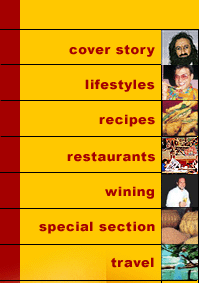


|
|
|
WELCOME to Mangalore city. It's hilly. It's a seaport. It's India's coffee and cashew capital. And it's getting increasingly famous for its distinctive and fiery cuisine. A cuisine of flavoursome chicken and prawn curries made with fresh coconut milk and fiery Coondapur masalas, and a vegetarian repertoire that ranges from red cucumber to raw jackfruit and white pumpkin to green banana. The city is cosmopolitan in its structure and food habits. There are the Bunts of the former South Kanara district, a community of genteel Brahmin vegetarian eaters and robust non-vegetarians who make their food with coconut milk and flavouring agents like tamarind, kokum and raw mango; there is the Mangalorean Christian who adds beef and pork to his cooking pot; and the Moplas, an interesting species of Malabari Muslims with Arab blood in their veins and a rich and spicy cuisine of chicken, meat, egg and biryanis Fish, of course, is the staple diet of Mangalore, and you have to go fishing on the Netravati River for the treasured Kane to really appreciate this delicacy when it is cooked as a gassi or fried with rawa and masala and served before you. And coffee is the popular drink, there are coffee estates in and around Mangalore, though the best brew is made of the Robusta and Arabica seeds plucked from the nearyby Coorg hills. Early mornings, though, the Mangalorean will forsake his coffee for fresh toddy tapped off the palm tree in his backyard. What he cannot consume, the lady of the house will toss into the rice and urad dal batter to make soft, fluffy and flavoursome Sannas next day. They have some unusual food there in Mangalore and that's because they bring some unusual ingredients to their cooking. Like the local spinach Besale which grows wildly and abundantly, raw banana and bamboo shoot. And the jackfruit and breadfruit, fruits used as vegetables in Mangalorean cooking, and a sweet cucumber called Taute that is actually a vegetable treated like a fruit and used extensively in the makingof Sambar. They are fairly health-conscious, these Mangaloreans,and that is why they rely on jaggery that is made of palm and not sugarcane. It makes the Payasam that much more special.
|

Home Page
About the mag
Subscribe
Advertise
Contact Us
 Kori Gassi Land
Kori Gassi Land